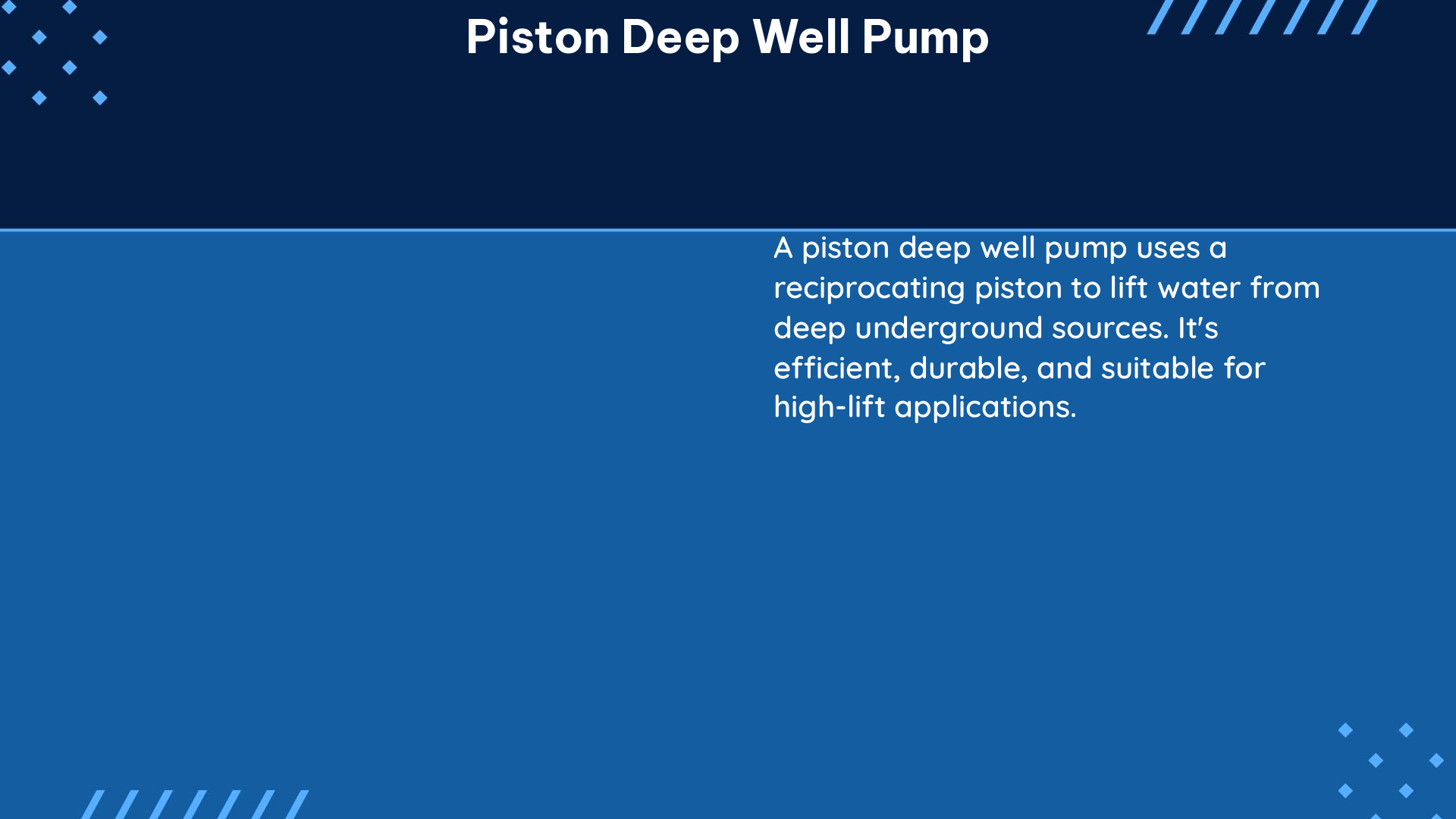Piston deep well pumps are a reliable and efficient solution for extracting water from great depths, typically in wells that are over 50 feet deep. These pumps are known for their durability, high-volume water handling capabilities, and versatility in various applications, making them a popular choice for both residential and commercial water supply systems.
Understanding the Technical Specifications
Horsepower (HP)
The horsepower (HP) of a piston deep well pump is a crucial specification that determines the amount of power the pump can generate. Piston deep well pumps typically have horsepower ratings ranging from 1/2 HP to 5 HP or more, depending on the size and capacity of the pump. For example, a 1 HP piston deep well pump can generate up to 746 watts of power, while a 5 HP pump can generate up to 3,730 watts.
Flow Rate
The flow rate of a piston deep well pump is another important specification, as it measures the amount of water the pump can move in a given period of time. Flow rates for piston deep well pumps are typically measured in gallons per minute (GPM) and can range from as low as 5 GPM to as high as 500 GPM or more, depending on the size and capacity of the pump. For instance, a 1 HP piston deep well pump may have a flow rate of 10-20 GPM, while a 5 HP pump can have a flow rate of 100-300 GPM.
Total Dynamic Head (TDH)
The total dynamic head (TDH) is a crucial specification that measures the total height the pump must lift the water, including both the vertical lift from the well to the surface and any friction losses in the piping. TDH for piston deep well pumps can range from a few feet to several hundred feet, depending on the depth of the well and the length and diameter of the piping. For example, a piston deep well pump with a TDH of 100 feet can lift water from a well that is 100 feet deep, while a pump with a TDH of 300 feet can handle a well depth of up to 300 feet.
DIY Installation and Maintenance

While piston deep well pumps can be more complex to install and maintain compared to other types of pumps, it is possible for a skilled DIYer to handle these tasks with the right tools and knowledge. Some key considerations for DIY installation include:
-
Well Size and Depth: Ensure that the piston deep well pump you select is compatible with the size and depth of your well. This will determine the pump’s horsepower, flow rate, and TDH requirements.
-
Piping Type and Size: Choose the appropriate type and size of piping to connect the pump to the water source and distribution system. Factors such as pipe material, diameter, and length can affect the pump’s performance and efficiency.
-
Power Source: Determine the power source for your piston deep well pump, which can be either 115V, 230V, or 460V, depending on the pump’s specifications and your electrical system.
-
Maintenance: Regular maintenance, such as checking for wear and tear, cleaning the pump, and replacing worn parts, is essential to ensure the longevity and optimal performance of your piston deep well pump.
Typical Piston Deep Well Pump Specifications
Here are some specific measurements and data points for a typical piston deep well pump:
| Specification | Range |
|---|---|
| Horsepower (HP) | 1 to 5 HP or more |
| Flow Rate (GPM) | 5 to 500 GPM or more |
| Total Dynamic Head (TDH) | 50 to 500 feet or more |
| Motor Voltage | 115V, 230V, or 460V |
| Pumping Level | 50 to 1000 feet or more |
| Static Water Level | 50 to 1000 feet or more |
| Drawdown | 10 to 50 feet or more |
| Well Size | 4 to 24 inches or more |
| Piping Size | 1 to 4 inches or more |
Reference Links
- Pump Basics – R.C. Worst & Co.
- Well Pumps: The Basics – Environmental Rental Equipment
- Selection of Sampling Pumps Used for Groundwater Monitoring at Hanford

The lambdageeks.com Core SME Team is a group of experienced subject matter experts from diverse scientific and technical fields including Physics, Chemistry, Technology,Electronics & Electrical Engineering, Automotive, Mechanical Engineering. Our team collaborates to create high-quality, well-researched articles on a wide range of science and technology topics for the lambdageeks.com website.
All Our Senior SME are having more than 7 Years of experience in the respective fields . They are either Working Industry Professionals or assocaited With different Universities. Refer Our Authors Page to get to know About our Core SMEs.